|
|
|
Sort Order |
|
|
|
Items / Page
|
|
|
|
|
|
|
| Srl | Item |
| 1 |
ID:
174551
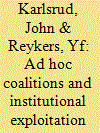

|
|
|
|
|
| Summary/Abstract |
While the increasingly thick web of global, regional and sub-regional security arrangements and institutions has received ample scholarly attention, the phenomenon of ad hoc military coalitions and how they impact these institutions has been relatively little explored. We examine ad hoc coalitions in international security responses and develop a tentative typology of military responses that takes ad hoc coalitions into consideration, where we differentiate in terms of institutionalisation and duration. Following a rational-choice institutionalist logic, we argue that institutional proliferation increases the chances of institutional exploitation. We illustrate this with how states apply a pick-and-choose approach in which institutional products but not frameworks are used. They use the interoperable forces, a common culture and mainstreamed doctrine, but not the formal deployment of rapid response mechanisms of eg the North Atlantic Treaty Organization and the African Union. In closing, we observe that institutional proliferation in international security facilitates a functionalist approach mainly inspired by national self-interest. Future research should examine whether this could result in dwindling relevance of international institutions, first in the domain of security, but later also in other domains.
|
|
|
|
|
|
|
|
|
|
|
|
|
|
|
|
| 2 |
ID:
153911
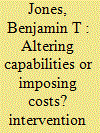

|
|
|
|
|
| Summary/Abstract |
How do military interventions affect the outcome of civil wars? The diversity of military interventions makes it difficult to answer this question; their variation means that they do not affect civil wars in a straightforward way. In particular, strategy and timing play a pivotal role in determining the effect of an intervention. Thus, I isolate three intervention strategies: indirect (bolstering the capabilities of the supported side), direct-conventional (degrading the capabilities of the opposition), and direct-unconventional (imposing costs on the opposition). I evaluate the impact of these strategies on the outcome of civil wars using a dataset of all civil wars from 1944 to 2007. My analysis reveals that the efficacy of intervention strategies varies over time. Third-party support for rebel organizations is most effective during a critical window early in a civil war. In contrast, direct military assistance for the government increases the odds of a government victory only once a civil war becomes protracted. It also reduces the odds of a negotiated outcome to the conflict, whereas indirect support for the government proves most effective early in the war. This work demonstrates that pooling all interventions together risks overlooking important differences in their effects on civil wars. It also carries with it important implications for states considering interventions in civil wars.
|
|
|
|
|
|
|
|
|
|
|
|
|
|
|
|
| 3 |
ID:
160089
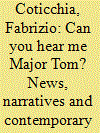

|
|
|
|
|
| Summary/Abstract |
This research explores the relationship between public narratives and the Italian military contribution to the International Security Assistance Force (ISAF) in Afghanistan (2001–2014). Despite attracting little attention in the literature, Italy has been one of the most crucial contributors of multilateral military missions around the world in the post-bipolar era. Italy has remained consistently engaged militarily in Afghanistan over the entire period of the ISAF mission. However, the country’s involvement has been characterised by differing and controversial views and perspectives among Italian political actors and the media. This study aims to reconstruct the core features of the strategic narratives and the media frames around the military intervention and it does so through a Qualitative Content Analysis on a collection of almost 200 articles published by four main Italian national newspapers. The goal of this paper is twofold: on the one hand, we systematically retrace the main discursive patterns and frames employed by the newspapers on the ISAF. On the other, we evaluate whether in the case of military interventions, the Italian media unveil critical inconsistencies and competitive arguments or whether they function as a repeater of the dominant political discourse. Thanks to the case study, we find that the Italian media supported the mainstream narratives.
|
|
|
|
|
|
|
|
|
|
|
|
|
|
|
|
| 4 |
ID:
123423
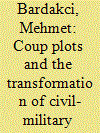

|
|
|
|
|
| Publication |
2013.
|
| Summary/Abstract |
This article examines the ongoing transformation of civil-military relations in Turkey under Justice and Development Party (AKP) rule, which was triggered by uncovering of the Ergenekon affair and a series of alleged plots against the AKP government by groups within the armed forces. Legal-constitutional changes, anti-coup trials, increasing civil influence in the military promotions and a dramatic turnaround of public opinion of the military interventions in the aftermath of the Ergenekon affair point to a paradigmatic shift in civil-military relations in Turkey.
|
|
|
|
|
|
|
|
|
|
|
|
|
|
|
|
| 5 |
ID:
128861
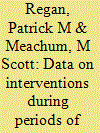

|
|
|
|
|
| Publication |
2014.
|
| Summary/Abstract |
Interventions into civil conflicts have been the focus of considerable research in recent years, but one of the limitations to many studies has been the emphasis on interventions once a conflict begins. While important, we know that states and other actors often take action prior to the onset of a civil war in hopes of diffusing - or exacerbating - a potentially volatile situation. To date, however, no one has been able to study these pre-conflict interventions because appropriate data did not exist. In this article we introduce a new dataset that fits this specific need. Our data identifies states that are at risk of civil war and codes instances of third-party military, economic, and diplomatic interventions. Based on forecasting models that derive risk scores for all states from 1957 to 2007, we are able to identify those states that are most at risk and provide detailed information about interventions that occur in those states. We include a brief empirical example that applies our new data on interventions to test for their effects on the likelihood of civil war or stability. Consistent with prior arguments regarding interventions during civil wars, we show that military interventions increase the risk of civil war onset, while economic and diplomatic interventions forestall that particular outcome. The limited example highlights just one of the potential uses for our new data. With it at hand, researchers will now have the ability to answer many of the vexing problems surrounding the processes that may or may not lead to civil war.
|
|
|
|
|
|
|
|
|
|
|
|
|
|
|
|
| 6 |
ID:
110320
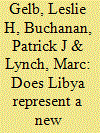

|
|
|
|
|
| Publication |
2012.
|
| Summary/Abstract |
In the last issue of The National Interest, we ran a cover story by Nikolas K. Gvosdev and Ray Takeyh positing that America's military role in helping bring down Libyan president Muammar el-Qaddafi represented a significant new era in the country's foreign policy-the ascendancy of a doctrine that placed far greater emphasis on humanitarian considerations as a rationale for military interventions overseas. This was a provocative thesis, and the authors' probing analysis and tight argumentation rendered it one that we were proud to display prominently in our journal. But it occurred to us that it certainly didn't represent the last word on the subject of the future of American foreign policy. And so we invited three prominent international-relations thinkers-Leslie H. Gelb, Patrick J. Buchanan and Marc Lynch-to weigh in with their own thoughts on the subject. Their musings follow, along with a final response from Gvosdev and Takeyh, who get the last word as a reward for introducing the subject in the first place.
|
|
|
|
|
|
|
|
|
|
|
|
|
|
|
|
| 7 |
ID:
134064
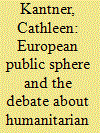

|
|
|
|
|
| Publication |
2014.
|
| Summary/Abstract |
Studies on the democratic control and legitimacy of Common Security and Defence Policy (CSDP) have thus far mostly focused on formal institutions. However, a comprehensive analysis requires including the 'sociocultural infrastructure' in which such formal institutions are embedded. Students of democracy have argued that the public sphere is a crucial dimension, if not a precondition for all mechanisms of democratic control in general. This paper investigates whether and in which ways Europeans participated in transnational European communication on humanitarian military interventions (1990-2005/2006). The paper analyzes a full sample of 108,677 newspaper articles published in leading newspapers of six EU member states, and the US as a comparative case. It demonstrates that the 'national' arenas of political communication are intertwined and allow ordinary citizens to make up their minds about common European issues in the highly controversial and normatively sensitive realm of humanitarian military interventions.
|
|
|
|
|
|
|
|
|
|
|
|
|
|
|
|
| 8 |
ID:
148296


|
|
|
|
|
| Summary/Abstract |
Despite the burgeoning literature on Russia’s renewed power politics, little attention has been paid to the fact that US reactions towards Russia’s military interventions were all but coherent. The USA has chosen weak measures in Georgia in 2008 (shaming) compared to its assertive response in Ukraine in 2014 (sanctions, hard deterrence). This article assesses the explanatory power of neorealist, liberal and constructivist theories for the variation in US reactions towards Russian interventions in Georgia and Ukraine. Our argument is that the constructivist perspective explains the cases best as it highlights the power and communality of normative assessments. The Ukraine crisis was perceived by the USA as a violation of core international norms, especially the non-use of force and the principle of territorial integrity. Relevant international norm carriers shared this assessment of the conflict. In contrast, the perception of the Georgian war centred on the issue of democracy promotion. While democracy is an important aim of US foreign policy, it does not summon the same normative importance as general principles of international law. Furthermore, the perception of the Georgian war remained contested among Western allies, which decreased the communality of the normative assessment.
|
|
|
|
|
|
|
|
|
|
|
|
|
|
|
|
| 9 |
ID:
073547
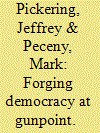

|
|
|
|
|
| Publication |
2006.
|
| Summary/Abstract |
Can liberal interventionism build liberal democracy? This manuscript examines the military interventions undertaken by the U.S., U.K., France, and the UN in the post-World War II era to see if they had a positive impact on democracy in target countries. Empirical analysis centers on multivariate time series, cross section PCSE and relogit regressions of political liberalization and democratization from 1946 to 1996. The former is operationalized with annual difference data drawn from the Polity IV data collection, whereas the latter is a binary variable denoting countries that cross a threshold commonly used to indicate the establishment of democratic institutions. An updated version of the International Military Intervention data set enumerates foreign military interventions. We find little evidence that military intervention by liberal states helps to foster democracy in target countries. Although a few states have democratized in the wake of hostile U.S. military interventions, the small number of cases involved makes it difficult to draw generalizable conclusions from the U.S. record. We find stronger evidence, however, that supportive interventions by the UN's "Blue Helmets" can help to democratize target states.
|
|
|
|
|
|
|
|
|
|
|
|
|
|
|
|
| 10 |
ID:
166607
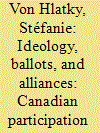

|
|
|
|
|
| Summary/Abstract |
The decision to employ force abroad is often a contentious political decision, where partisanship plays a crucial role. Prior to military intervention, political parties usually make their ideologically distinctive preferences clear and seek to implement them once in power. What remains unclear, however, is how ideology affects the decision to use military force. This article contends that alliance and electoral calculations constrain the ability of political parties to implement their ideological preferences with regards to the use of force. It examines a “most likely” case for the partisan theory of military intervention, namely Canada’s refusal to take part in the invasion of Iraq and its decision to commit forces to the war against the Islamic State. It finds that only in combination with alliance and electoral calculations does executive ideology offer valuable insights into Canada’s military support to U.S.-led coalition operations, which contributes to our understanding of allied decision-making.
|
|
|
|
|
|
|
|
|
|
|
|
|
|
|
|
| 11 |
ID:
061253
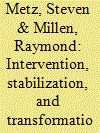

|
|
|
| 12 |
ID:
123425
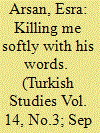

|
|
|
|
|
| Publication |
2013.
|
| Summary/Abstract |
Turkey is a country where democratization process has been repeatedly interrupted by military interventions in the past 50 years. Censorship and self-censorship have become ordinary practices in the media, mainly due to weak parliamentary representations followed by oppressive coup periods. Yet even though a democratically elected government is currently in charge of the country, censorship of the press remains to be a common and systematic to silence alternative views. It is also claimed that self-censorship is widespread within the press. A report published by Freedom House in 2010 argues that while Turkish officials continue to enforce strict laws, journalists are frequently jailed for discussing issues such as the Kurdish problem, the military or political Islam. The government that is led by the Justice and Development Party (Adalet ve Kalkinma Partisi) is continuing to crack down on unfavorable press coverage. This article presents the findings of a survey titled "Censorship and Self-Censorship in Turkey, 2011." The participants of the study were Turkish journalists and the questions revolved around their personal experiences with regards to censorship and self-censorship. Their answers reveal why Turkish media seldom makes news for public interest.
|
|
|
|
|
|
|
|
|
|
|
|
|
|
|
|
| 13 |
ID:
174241
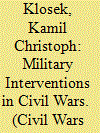

|
|
|
|
|
| Summary/Abstract |
This study extends existing scholarship on the influence of corporate/industry investments on the onset of military interventions in civil wars challenging prior null findings. It proposes a state-centric theoretical framework and argues that researchers have to differentiate between the protection and the advancement of corporate/industry interests. Random-effect logit models in combination with UCDP data on interventions from 2001 until 2009 corroborate the hypothesis that the protection of existing foreign direct investments, as well as the protection of prior arms trade, increase the willingness of a state to intervene militarily in a civil war.
|
|
|
|
|
|
|
|
|
|
|
|
|
|
|
|
| 14 |
ID:
166605
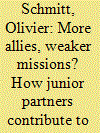

|
|
|
|
|
| Summary/Abstract |
There is a growing consensus that multinational military operations are often less effective than the theoretical sum of their constitutive parts. Multiple chains of command, restriction on intelligence sharing, and capability aggregation problems can reduce fighting power. However, partners may be necessary to provide legitimacy to an intervention. As such, most studies assume that the state leading a coalition (usually the United States) has to accept a degree of operational ineffectiveness in order to gain political benefits from the participation of junior partners to a multinational military operation. However, such analysis puts all junior partners under the same category, without taking into account the differentiated contributions of those junior partners based on their relative military power and international status. This article explores variation between the junior partners’ contributions and their impact on coalition political and military dynamics. It teases out the implications of adopting a fine-grained analysis of junior partners.
|
|
|
|
|
|
|
|
|
|
|
|
|
|
|
|
| 15 |
ID:
085111
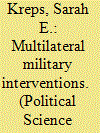

|
|
|
|
|
| Publication |
2008.
|
| Summary/Abstract |
Sarah E. Kreps advances a two-level definition of multilateralism that incorporates both quantitative and qualitative attributes of cooperation. She argues that the relative decline in American power, rather than leading to more robust multilateralism, might instead make UN-authorized interventions less tenable and ad hoc "coalitions of the willing" a viable alternative.
|
|
|
|
|
|
|
|
|
|
|
|
|
|
|
|
| 16 |
ID:
190807
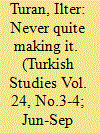

|
|
|
|
|
| Summary/Abstract |
The article addresses the question of impediments to the consolidation of democratic governance in Turkey. Historical path dependence (weight of history), cultural bifurcation emanating from Turkey’s modernization strategy, the legacy of the single party experience, the choice of particular economic development policies, and the role of individual leaders are examined with a view to how each may have contributed to a comprehensive set of difficulties Turkey has encountered in its efforts to evolve into a democratically governed society.
|
|
|
|
|
|
|
|
|
|
|
|
|
|
|
|
| 17 |
ID:
176024
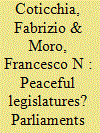

|
|
|
|
|
| Summary/Abstract |
The article contributes to the growing debate on parliamentary war powers and shows how parliaments matter in shaping both force deployment and force employment. Through original analysis of the Italian and German decision-making on military interventions after the Cold War, the article illustrates how formal and informal constraints shape the opportunity structures faced by executives that are willing to undertake military interventions. Revisiting, and building on, the great deal of research recently emerged on institutional constraints to the use of force, the article details the types of costs – namely, transaction and audience costs – linked to involvement of legislatives in the decision-making and provides empirical support for theories based on parliamentary war powers, adding new dimensions of analysis.
|
|
|
|
|
|
|
|
|
|
|
|
|
|
|
|
| 18 |
ID:
145725
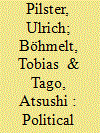

|
|
|
|
|
| Summary/Abstract |
Several studies have claimed that changes in the political leadership of a country affect foreign policy decision making. The following paper systematically tests this in the context of states' participation in military coalition operations. By building on previous theoretical models, the authors argue that new leaders may differ from their predecessors in that the former (i) have dissimilar preferences with regard to the involvement in military interventions, (ii) evaluate relevant information differently, and (iii) are less likely to be entrapped in intervention policies. Ultimately, the net effect of these factors should make it more likely that political leadership turnovers are associated with premature withdrawals from ongoing military coalitions. The theory is tested by quantitative analyses of newly collected data on military coalition operations in 1946–2001 and a qualitative case study. The authors find strong and robust support for their argument.
|
|
|
|
|
|
|
|
|
|
|
|
|
|
|
|
| 19 |
ID:
174772
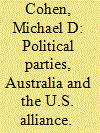

|
|
|
|
|
| Summary/Abstract |
What causes variation in the foreign policies of U.S. allies regarding their desired U.S. military role in their region and their troop commitments to U.S. military interventions? This paper addresses this question through documenting and explaining the sources of variation in Australia’s foreign policies regarding these issues over four decades. Treating the two major political parties in Australia and their respective leaders who self-select into them as endogenous, the paper argues that Australian foreign policy, whilst always supportive of the U.S. alliance, has systematically varied. This variation has correlated with the political party in power while the late Cold War and post-Cold War balances of power remained constant. While the Labor party has only been willing to send combat troops to large U.S. military interventions when the latter have a supporting United Nations Security Council Resolution, the conservative Liberal party has been willing to military intervene without this multilateral support. The Labor party, unlike the Liberal party, has also frequently proposed the formation and consolidation of multilateral regional institutions. These preferences render the U.S. to have been necessary for the Labor Party but sufficient for the Liberal party. Future Sino-U.S. armed conflict would provide a harder test of these hypotheses.
|
|
|
|
|
|
|
|
|
|
|
|
|
|
|
|
| 20 |
ID:
072902
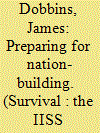

|
|
|
|
|
| Publication |
2006.
|
| Summary/Abstract |
Preparation for nation-building requires that responsible political leaders consult both with regional and functional experts, those who know why the society in question descended into conflict and those who know from experience elsewhere how to put such societies back together. Goals must be established which transcend the most immediate and normally negative purposes of the intervention, e.g. halting conflict, stopping genocide or turning back aggression. These positive goals must be commensurate with the scale of military manpower and economic assistance likely to be committed. The larger the social transformation envisaged, the greater the resistance likely to be encountered. The most common cause for the failure of nation-building endeavours is a mismatch between objectives and commitments
|
|
|
|
|
|
|
|
|
|
|
|
|
|
|
|
|
|
|
|
|